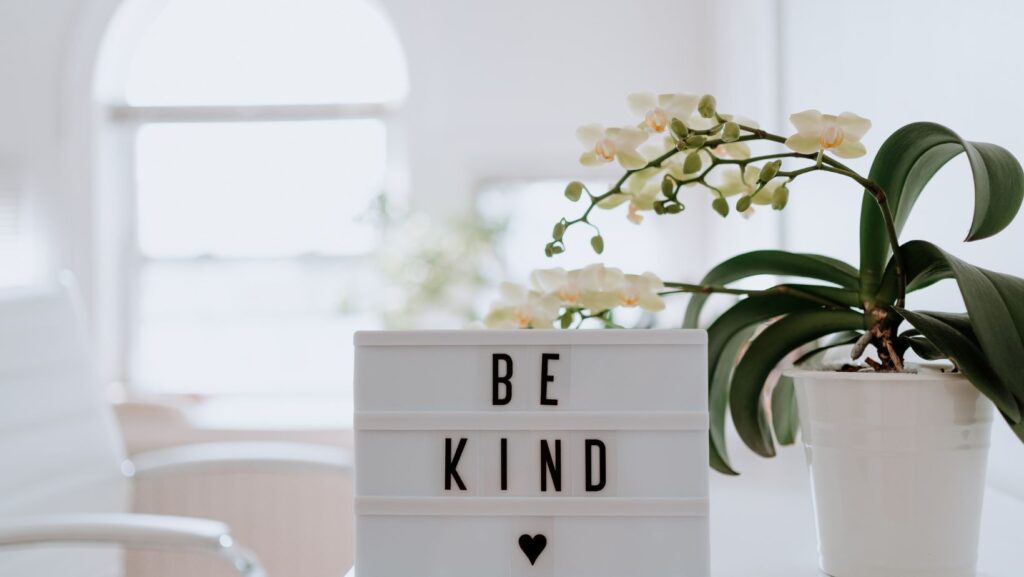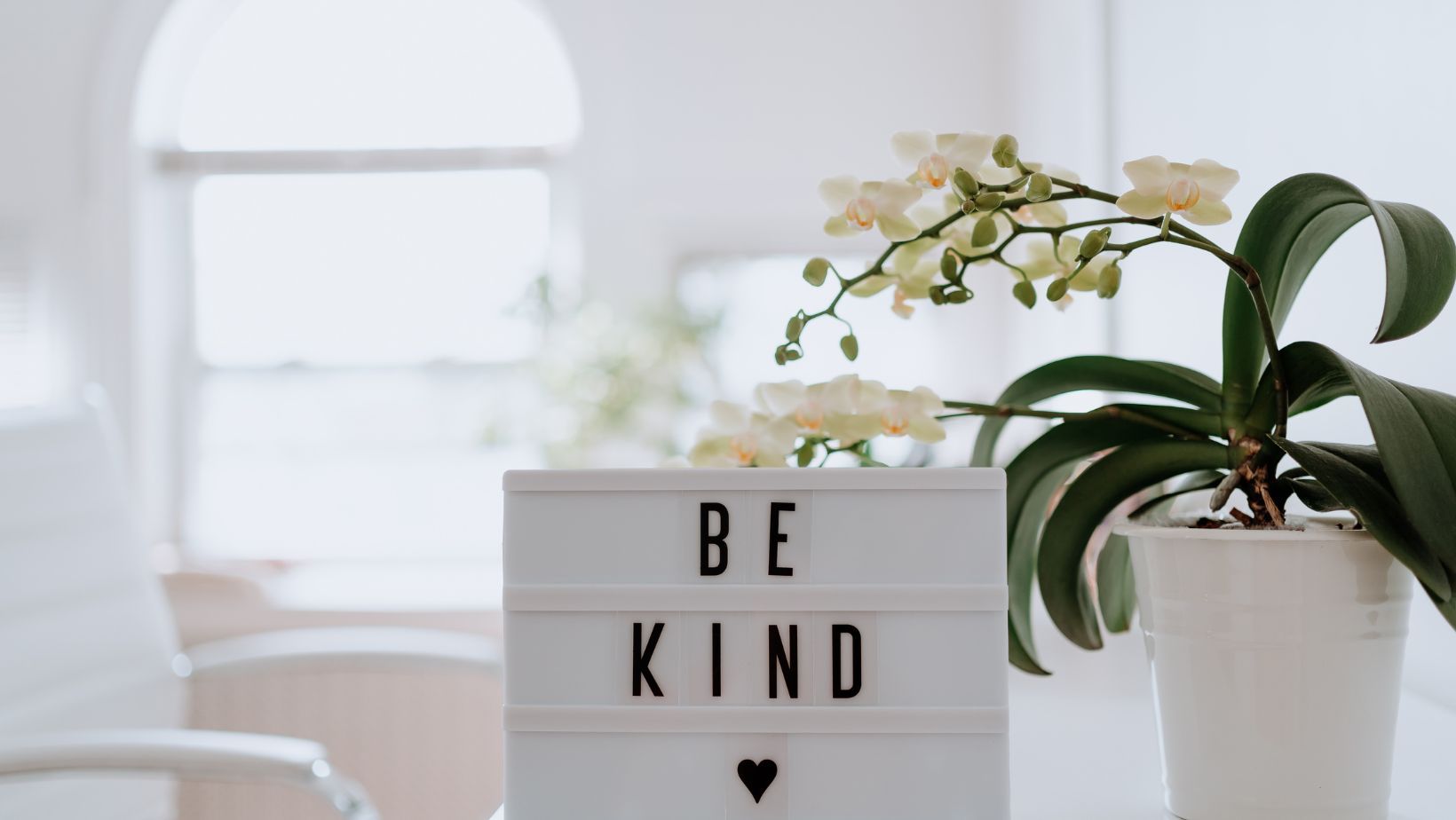Be Nice: A Guide to Mindful Kindness
The simple yet profound mantra to be nice can be a beacon of hope and transformation in a world that often feels dominated by negativity and strife. This article looks at why kindness is important and how it can make society happier and more peaceful. We’ll see how kindness impacts us, focusing on mindfulness and personal development, and talk about easy ways to be kind every day.

The Power of Kindness in Everyday Interactions
The concept of being nice is not just a fleeting act of good manners; it’s a mindset that can transform our daily interactions. A warm smile for a coworker, a kind act for a neighbor, or comforting words for a friend can really make someone’s day brighter. Being kind creates a positive environment where we encourage others to be kind too, creating a friendlier and more supportive community.
Kindness and Mental Health
The benefits of choosing to be nice extend far beyond the immediate joy it brings to others. Engaging in acts of kindness has been shown to have a profound effect on our mental health. It reduces stress, combats depression, and boosts our overall mood. By being kind to others, we feel a sense of fulfillment and purpose, enhancing our self-esteem and sense of belonging.
The Science Behind “Be Nice”
Being kind isn’t just emotionally beneficial; it has tangible physical benefits too. Studies have found that by being friendly and acting kindly, our bodies release oxytocin, often called the ‘love hormone.’ This hormone plays a crucial role in lowering blood pressure and reducing inflammation, leading to better heart health. Being nice is not only good for the soul but also the body.
Building Relationships Through Kindness
In personal or professional relationships, the mantra to be nice can be incredibly powerful. It fosters an environment of trust, respect, and mutual understanding. By being kind, we show others we value and appreciate them, strengthening bonds and deepening connections. A simple act of kindness can often be the bridge that mends a strained relationship or enhances a good one.
The Challenge of Being Nice
Of course, choosing to be kind isn’t always easy, especially when faced with negativity or adversity. It requires patience, empathy, and, sometimes, a deep breath. In challenging situations, responding with kindness instead of reacting impulsively can change the course of an interaction for the better. It can defuse tension and open the door to more constructive and respectful dialogues.
Kindness in a Digital World
In the digital age, where interactions often happen online, the importance of being nice remains paramount. The anonymity and distance the internet provides can sometimes lead to harsher interactions. Being kind in our online messages can help build a nicer and more positive online community. Whether commenting politely on social media or sending a thoughtful email, digital kindness is just as important.
Teaching Kindness to the Next Generation
One of the most significant ways we can promote a kindness culture is by teaching it to children. Teaching young minds to be kind, empathetic, and respectful can create a future where these values are natural in society. Additionally, outdoor activities for kids can encourage them to be more mindful. It starts with setting an example and providing opportunities for children to practice kindness in their daily lives.
Be Nice: A Global Movement
The cumulative effect can be extraordinary if more people embrace the kindness philosophy. On a global scale, kindness brings cultures together, helps countries work together, and makes the world more caring. Every small act of kindness adds up to this big change, showing that even small things can make a difference.
Implementing “Be Nice” in Daily Practice
It’s important to make this philosophy a regular practice to truly embrace it. This can be as simple as setting a daily intention to perform at least one act of kindness. It could be complimenting someone, offering assistance without being asked, or just listening to someone who needs to talk. The key is to make kindness a habit, an integral part of our daily routine.
Overcoming the Barriers to Kindness
In a world where cynicism and self-interest can sometimes prevail, choosing to be nice can sometimes feel counterintuitive. Recognizing and overcoming the barriers that prevent us from being kind is essential. This might involve challenging our prejudices, stepping out of our comfort zones, or simply being more aware of the needs of others around us.

The Role of Empathy in Being Nice
Empathy is at the heart of this mindset. It’s about understanding and sharing the feelings of others. By being empathetic, we can connect better with people, understand how they see things, and respond to them with genuine kindness and caring.
Kindness as a Response to Conflict
Responding with kindness can be a powerful tool in times of disagreement or conflict. It doesn’t mean ignoring your own feelings or always conceding to others. Instead, it’s about trying to understand and finding a calm and helpful solution when there are problems.
Celebrating Acts of Kindness
Recognizing and celebrating acts of kindness, both in ourselves and others, reinforces the value of being nice. This can be as simple as expressing gratitude when someone is kind to us or acknowledging our efforts to be kind, even if they seem small.
The Lasting Impact of “Be Nice”
The cumulative effect of choosing to be kind can be profound. It creates a legacy of kindness that can influence others and shape the future. By being friendly, we contribute to a culture of compassion and respect, which can have a lasting impact on our communities and the world at large.
Encouraging a Culture of Kindness
It starts with individuals, but being nice can spread to groups, communities, and societies. Encourage others to be kind, share stories of how it helps, and be a role model for the being nice philosophy.
Integrating Kindness into Mindfulness Practice
Adding kindness to our mindfulness practice enhances our well-being and connection to others. Mindfulness teaches us to be present and aware, and when combined with kindness, it becomes a vital tool for personal growth and positive interaction.
To Summarize
Following the being nice philosophy is like starting a journey that makes our lives better and can make the world a more positive place.
Being consistently kind and mindful helps make a strong community, keeps us mentally and physically healthy, and makes the world more caring and understanding. As we grow and deal with life’s challenges, let’s make being nice our main rule. When we’re kind every day, we help create a history of caring, positively influence others, and make a future where kindness is just how things are.
Remember, even small acts of kindness can make a significant impact. Let’s all work towards creating a culture where everyone celebrates, encourages, and practices being nice.


